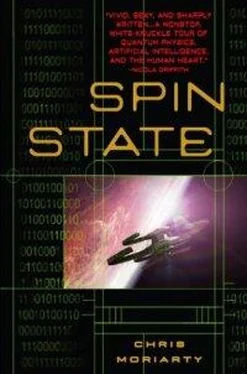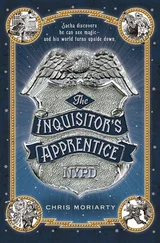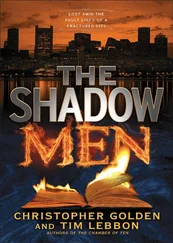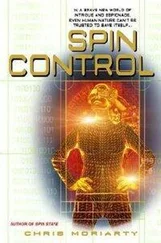“The Consortium,” Li said, ignoring the gesture to pursue her suspicions. “They’re supremacists, right?” She had never been able to understand the alien tangle of AI politics, but she did know that much.
“Separatists is probably a better way of describing it. Like I said, most Emergents just aren’t that interested in humans.”
“But the Consortium was the group involved in Tel Aviv, right? The ones who killed the Security Council agent.”
Roland’s hand froze on its way to the ashtray and a shower of ash fell unnoticed onto the carpet’s blue-and-gold arabesques. “Why ask me?” he said sharply. “I wasn’t even there.”
“I’m just pointing out that the Consortium’s member AIs could use this intraface if they had some reason to use it.”
“Of course they could.”
Li swallowed. “And so could you, right? In fact, you could use it better than any other AI. Because you’re more human, aren’t you? Because you process data with emotions, not logic. You’re in all the Emergent-systems textbooks, the only one of the twenty-first-century affective-loop-driven AIs who hasn’t decohered and gone… wherever they go when that happens. You’re practically a species of one.”
For a moment she thought he wasn’t going to answer. His cigarette crackled and smoked. Another rain of ash fell to the floor. Birds sang beyond the tall windows. And meanwhile Cohen sat so perfectly, unbreathingly still that Roland’s pretty face might have been carved from stone.
When he spoke, it was in a voice as soft and cold as falling snow. “Whatever you’re trying to say, Catherine, why don’t you just go ahead and say it?”
Li looked out at the green leaves trembling beneath snowfields so blindingly white and oceans so brilliantly blue that you could almost imagine you were looking at clouds and sky, almost imagine you were standing on solid ground and not plastered to a spinning ring of vacuum-hardened virusteel. Then she leaned forward and finally asked the question that had been hanging on her tongue since she arrived:
“Was this the target tech on Metz, Cohen? Was it the intraface you were after?”
He shook himself, put his cigarette out, and leaned forward to stare at her. “What makes you think that?”
“The sunburst.” She pointed at the raised shape on the wire’s black sheathing. “It was on the floor there.”
“I don’t think you’re supposed to remember that, Catherine.”
She lit a cigarette herself.
“Are you having bleed-through? Have you told the psychtechs?” He sighed. “No. Of course not. You need to, Catherine. You’re playing with fire.”
She scoffed. “You don’t seriously believe the line about memory washing for our own good? To keep us simple soldiers from suffering over the nasty but necessary things they make us do?”
“You know me better than that. But if your soft memory’s breaking into your edited files there’s something seriously wrong with your internals. You’re too heavily wired to risk malfunctioning internals. Go see someone, for Heaven’s sake. I’ll pay if money’s a problem.”
“Who asked you to pay? Answer my question, Cohen. Was this what we went to Metz for?”
“No—”
Li stood up. “I don’t believe you. And I don’t like being lied to.”
“Sit down,” he said—and there was an edge in his voice that made her obey him. “Yes, we were chasing the intraface on Metz. But we weren’t looking for this component. We were looking for the wetware schematics and the psychware source code.” He kept his eyes fixed on hers, watching her reaction. “Look, this isn’t a VR rig or a UN grunt’s wire job. This is a genuine neural net, both on the AI and the human sides of the intraface. You can’t grow that in viral matrix—not when the device itself is still in the experimental stage. You need a body.”
Li shivered. “The constructs we saw in the lab were just… hosts, then?”
“Exactly.”
“And what about that?” She gestured to the wire on the table between them.
“Forget that. It’s nothing. An accessory. The kind of thing you get with the real equipment and shove in a bottom drawer somewhere and forget about. No, the thing you really need is the AI component of the intraface. That’s loaded onto an AI somewhere, probably an AI that’s enslaved to an Emergent network. Find that, and you’ll know exactly who you’re up against.”
“That’s what I’m asking you, Cohen. Who is it? Nguyen was paying you in tech. What were you going to do with it? What does ALEF want it for?”
“They don’t want it,” Cohen said. “I do.”
“Why?”
Cohen started to speak, then snapped his mouth shut and turned away to light another cigarette. “Stay offstream,” he said. “I’ll nose around in ALEF’s databases, chat up a few old acquaintances and see what I can turn up without drawing unwanted attention. You go back down that mine shaft. Find out exactly what Sharifi was doing. And who she was talking to. And don’t call me. Nguyen will certainly have your outgoing mail monitored, and I think it’s safer if we don’t talk until I get an offstream entanglement source set up.”
He rose and looked at his wristwatch, a paper-thin affair of buttery pink gold whose smooth face was embossed with a stylized Templar’s cross. Time was up. Li had clearly gotten all the answers she was going to get today.
“Come on then.” He smiled, catching up her hand in his and coaxing her to her feet. “Let’s go out through the garden. Perhaps the birds will be out. Did I tell you that our bioresearch division has reengineered a naturally reproducing cliff swallow? And I have a new lilac to show you. One that even your barbarously practical soul will appreciate.”
He drew her arm through his, and they stepped through the tall doors together into the green-speckled sunlight of his personal jungle.
Anaconda Strike: 16.10.48.
They were bringing the rats back in when Li and McCuen got to the pithead the next morning.
They brought them in traps and dented rusty cages and every imaginable kind of container. The miners even humped them in from Shantytown on the surface shuttles when they came on shift. Six full traps traveled down in the cage with Li and McCuen, and when they hit pit bottom the pit ponies were already waiting to load them onto the coal carts and send them trundling off into the mine’s far corners. Judging from the heap of empty cages piling up at pit bottom, Li guessed the relocation had been in full swing for at least a shift or two.
No manager showed up to stop it. They wouldn’t dare; some of the fiercest wildcat strikes in Compson’s history had sparked over the poisoning of mine rats. Miners loved their rats. Befriended them. Believed in them. The rats smelled poison gas long before any human or posthuman could, and they were attuned to the roof’s settling and cracking, to the silent hang-ups that preceded a big cave-in. When the rats left the mine, disaster was on the horizon. If the rats stayed, it was safe—or at least no riskier than usual.
“How can they stand it?” McCuen muttered as they started down the main gangway.
Li followed his gaze to a miner who was sitting on a gob pile breaking off pieces of his sandwich and tossing them to a trio of rats. It made an eerie picture: the black of the man’s coal-coated skin, the black of the rats’ fur, their round black eyes riveted on the grimy fingers that reached again and again into the gleaming lunch pail.
“They’re pretty clean,” she said. “You can’t catch much from them except plague. And even that you’re more likely to get from people these days.”
McCuen just shook his head and made a spitting sound in his throat. “You thought about Gould any more?” he asked.
Читать дальше












